Daily Archives: September 21, 2016
Auditors question spending at Louisiana fisheries agency
Here are some preliminary findings from the Louisiana Legislative Auditor’s office, which raises questions about spending in the state’s Department of Wildlife and Fisheries from 2010 through 2015. A draft of the audit report was obtained by The Associated Press and hasn’t been released publicly yet: Less than half the 2,376 fish samples expected to be tested in a seafood safety program financed by BP were collected. A biologist wasn’t always present for the sampling, auditors say, and the sampling operation was overseen by an employee who “did not have supervisory or biology education or experience.” Unnecessary boats, fishing equipment, cameras and computers were bought with the money, according to the draft report, which says the fish testing team spent $3 million on testing of 1,091 samples that couldn’t determine fish safety, the equivalent of $2,796 spent per tested fish. Federal grant funds were spent to buy a $220,000 used boat, motors and a trailer “that appeared to have little or no benefit to the agency,” has been used twice since 2012 and have cost nearly $38,000 to maintain and repair, another $764,000 in clothing and uniform purchases, sponsorship spending and contracts, Nearly $134,000 was paid, for example, to a university for the design and upkeep of a website that benefited two private entities that host annual fishing rodeos,,, Read the rest here 20:25
from 2010 through 2015. A draft of the audit report was obtained by The Associated Press and hasn’t been released publicly yet: Less than half the 2,376 fish samples expected to be tested in a seafood safety program financed by BP were collected. A biologist wasn’t always present for the sampling, auditors say, and the sampling operation was overseen by an employee who “did not have supervisory or biology education or experience.” Unnecessary boats, fishing equipment, cameras and computers were bought with the money, according to the draft report, which says the fish testing team spent $3 million on testing of 1,091 samples that couldn’t determine fish safety, the equivalent of $2,796 spent per tested fish. Federal grant funds were spent to buy a $220,000 used boat, motors and a trailer “that appeared to have little or no benefit to the agency,” has been used twice since 2012 and have cost nearly $38,000 to maintain and repair, another $764,000 in clothing and uniform purchases, sponsorship spending and contracts, Nearly $134,000 was paid, for example, to a university for the design and upkeep of a website that benefited two private entities that host annual fishing rodeos,,, Read the rest here 20:25
NEFMC Press Release: Council Approves 2017 US/Canada TACs; hears FW 56 progress
 NEFMC approves the 2017 total allowable catch for three groundfish stocks on Georges Bank. The agreement sets the shared TAC at 730 metric tons.The U.S. will be allowed to take 146 metric tons and Canada will get the rest. Read the rest here 17:31
NEFMC approves the 2017 total allowable catch for three groundfish stocks on Georges Bank. The agreement sets the shared TAC at 730 metric tons.The U.S. will be allowed to take 146 metric tons and Canada will get the rest. Read the rest here 17:31New Effort Underway To Study Black Sea Bass In Southern New England
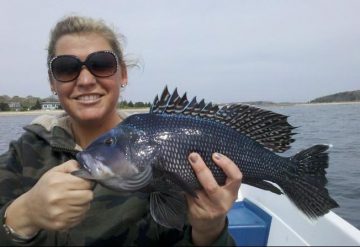 The Commercial Fisheries Research Foundation is kicking off a new project to collect data on black sea bass, a species that has moved north in search of cooler water. Catch limits for black sea bass in New England are a small compared to the Mid-Atlantic states, where the fish are typically found, according to Anna Malek Mercer, the foundation’s executive director. That means New England fishermen are throwing back very large quantities of black sea bass, she said. And it’s a highly valuable species. “So this will fetch at the dock between $4 and $7 a pound,” said Malek Mercer. “It’s super important in that way. Really could begin to fill some of this economic void caused by the downturns in things like ground fish and southern New England lobsters. ” The project will enlist Rhode Island fishermen to collect data on black sea bass. Read the story here 16:29
The Commercial Fisheries Research Foundation is kicking off a new project to collect data on black sea bass, a species that has moved north in search of cooler water. Catch limits for black sea bass in New England are a small compared to the Mid-Atlantic states, where the fish are typically found, according to Anna Malek Mercer, the foundation’s executive director. That means New England fishermen are throwing back very large quantities of black sea bass, she said. And it’s a highly valuable species. “So this will fetch at the dock between $4 and $7 a pound,” said Malek Mercer. “It’s super important in that way. Really could begin to fill some of this economic void caused by the downturns in things like ground fish and southern New England lobsters. ” The project will enlist Rhode Island fishermen to collect data on black sea bass. Read the story here 16:29
Lawsuit in the works over Southern Flounder
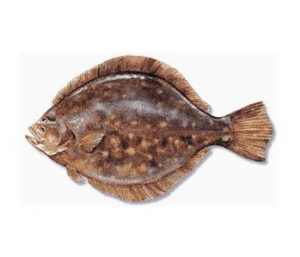 Carteret County will join fisheries groups in fighting the state Marine Fisheries Commission’s southern flounder supplement changes to reduce catch, which local fishermen say will kill the flounder industry here and cause a ripple effect in other local economic sectors. “I fished for a living, I know what the implications would’ve meant for my family if you’d have taken half of my income from the fall,” Commissioner Jonathan Robinson told the county board. “It means somebody’s not going to have Christmas. It means somebody’s going to have to decide whether to be cold this winter or have something to eat.” On his recommendation, county commissioners unanimously agreed to a resolution supporting a potential lawsuit from state and regional fishermen’s associations, primarily the N.C. Fisheries Association, against the MFC during their Monday meeting in the administration building. Consideration of the complaint follows the November 2015 adoption of a supplement to southern flounder management regulations, a process which critics say circumvented standard amendment procedures after stopgap reassurances in the form of stock assessments failed to pass peer review. “It didn’t pass the smell test. The science was flawed. It couldn’t pass independent peer review – the chief criteria for the development of any new regulations,” Mr. Robinson said. Read the rest here 14:19
Carteret County will join fisheries groups in fighting the state Marine Fisheries Commission’s southern flounder supplement changes to reduce catch, which local fishermen say will kill the flounder industry here and cause a ripple effect in other local economic sectors. “I fished for a living, I know what the implications would’ve meant for my family if you’d have taken half of my income from the fall,” Commissioner Jonathan Robinson told the county board. “It means somebody’s not going to have Christmas. It means somebody’s going to have to decide whether to be cold this winter or have something to eat.” On his recommendation, county commissioners unanimously agreed to a resolution supporting a potential lawsuit from state and regional fishermen’s associations, primarily the N.C. Fisheries Association, against the MFC during their Monday meeting in the administration building. Consideration of the complaint follows the November 2015 adoption of a supplement to southern flounder management regulations, a process which critics say circumvented standard amendment procedures after stopgap reassurances in the form of stock assessments failed to pass peer review. “It didn’t pass the smell test. The science was flawed. It couldn’t pass independent peer review – the chief criteria for the development of any new regulations,” Mr. Robinson said. Read the rest here 14:19
Athearn Marine Agency Boat of the Week: 79.8′ Steel Slime Eel/Lobster, 525HP, 8 Cylinder CAT, 2 gen sets
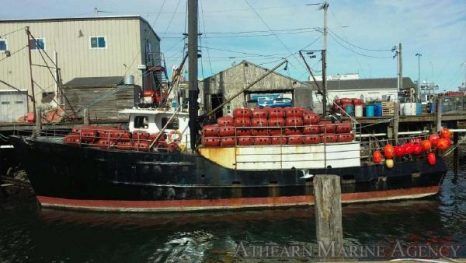 Specifications, information and 14 photo’s click here To see all the boats in this series, Click here 13:50
Specifications, information and 14 photo’s click here To see all the boats in this series, Click here 13:50
Appeal filed asking the court to overturn U.S. District Court Judge Joseph LaPlante’s July 29 at-sea monitor decision
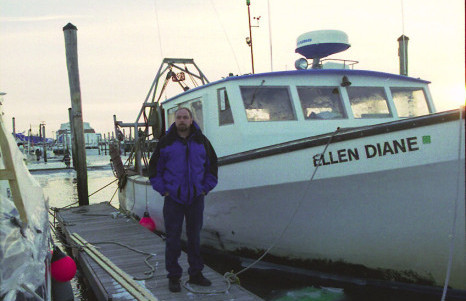 A fisherman is appealing a federal judge’s decision to allow the government to continue forcing fishermen to pay for at-sea monitors. Hampton fisherman, David Goethel, filed the appeal Sept. 6 and was joined by the Northeast Fishery Sector 13, which represents fishermen from Massachusetts to North Carolina. They are asking the court to overturn U.S. District Court Judge Joseph LaPlante’s July 29 decision that said the National Oceanic and Atmospheric Association was within its constitutional rights to force Northeast ground fishermen to pay for the monitors. Goethel and the fishery sector filed their original lawsuit last December, claiming it was unconstitutional for NOAA to require the industry to fund the monitors, which join fishermen on a percentage of fishing trips each year and cost approximately $700 per each of those days. Read the rest here 13:25
A fisherman is appealing a federal judge’s decision to allow the government to continue forcing fishermen to pay for at-sea monitors. Hampton fisherman, David Goethel, filed the appeal Sept. 6 and was joined by the Northeast Fishery Sector 13, which represents fishermen from Massachusetts to North Carolina. They are asking the court to overturn U.S. District Court Judge Joseph LaPlante’s July 29 decision that said the National Oceanic and Atmospheric Association was within its constitutional rights to force Northeast ground fishermen to pay for the monitors. Goethel and the fishery sector filed their original lawsuit last December, claiming it was unconstitutional for NOAA to require the industry to fund the monitors, which join fishermen on a percentage of fishing trips each year and cost approximately $700 per each of those days. Read the rest here 13:25
Hybridization – Escaped farmed salmon are breeding with wild salmon and producing offspring
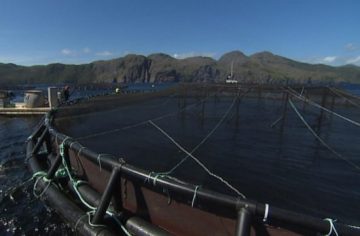 Research has confirmed that escaped farmed salmon are breeding with wild salmon and producing offspring in many rivers in Newfoundland. “We did find evidence of successful breeding between farmed and wild salmon. Approximately a third of the individuals we sampled showed evidence of hybrid ancestry,” said Department of Fisheries and Oceans scientist Ian Bradbury, of the unpublished study presented at an international aquaculture conference in St. John’s on Tuesday. Researchers studied thousands of fish in 18 rivers on the island’s south coast, and found evidence of interbreeding in 17 of them. “It was widespread across a suite of the rivers that we looked at. I think there was only one river where we didn’t see evidence of hybridization,” said Bradbury. It’s estimated that over the decades since the advent of aquaculture, more than 750,000 salmon have escaped from fish farms in the province. The new study sheds light on what happens to them in the wild. Read the story here 11:26
Research has confirmed that escaped farmed salmon are breeding with wild salmon and producing offspring in many rivers in Newfoundland. “We did find evidence of successful breeding between farmed and wild salmon. Approximately a third of the individuals we sampled showed evidence of hybrid ancestry,” said Department of Fisheries and Oceans scientist Ian Bradbury, of the unpublished study presented at an international aquaculture conference in St. John’s on Tuesday. Researchers studied thousands of fish in 18 rivers on the island’s south coast, and found evidence of interbreeding in 17 of them. “It was widespread across a suite of the rivers that we looked at. I think there was only one river where we didn’t see evidence of hybridization,” said Bradbury. It’s estimated that over the decades since the advent of aquaculture, more than 750,000 salmon have escaped from fish farms in the province. The new study sheds light on what happens to them in the wild. Read the story here 11:26
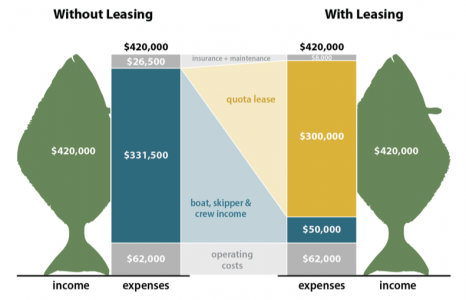
Owning the Owner Operator Policy
I read a blog post this week and the first paragraph rang so true to me: how most media stories would lead you to believe that the fishery is on its last legs and a dying industry when the opposite is in fact the case. What really caught my interest though was that there is a movement in the United States that if new fishing licences are issued, that they be to owner operators. At a time when Canada’s commitment to owner operator fisheries seems to be seriously in question, it’s interesting to see other countries advocating and moving in that direction. Owner operator fisheries means simply that the person who owns the boat and license is the one on the water fishing. While the official policy jargon in Canada will tell you that the Department of Fisheries and Oceans supports owner operator fisheries, the reality of policy decisions over the past two decades that I’ve been in the fishery have resulted in quite the opposite: management has moved towards individual transferable quotas (ITQ’s) which ultimately result in consolidation of access to the resource for a few (mainly) corporate interests who then hire people to fish. Read the story here. 10:16
The Shark Fin Ban That Should Be Banned – Shark Fin Trade Elimination Act of 2016
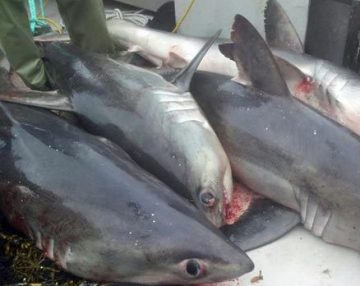 In the five seconds it takes to read this sentence, an estimated 16 sharks around the world have been killed. If you read on to the end of the article, that number will have risen to about 770. Every year, fishers haul up to 73 million sharks onto boats across the world’s oceans and trim their fins. In many cases, the rest of the body is thrown overboard to swim without propulsion. And without propulsion, no life-giving water flows over the sharks’ gills. They drown. This is shark finning, a cruel practice that feeds the demand for the Chinese delicacy of shark fin or fish wing soup. From boat to bowl, it is tasteless. To curb the death toll, the US Congress plans to introduce the Shark Fin Trade Elimination Act of 2016. If passed, to sell or possess shark fins would be a punishable offense. It’s the ultimate protection from being made into soup. Strange, then, that people who dedicate their lives to protecting sharks are vehemently opposed to the bill. In a letter to Senator Bill Nelson, Rob Hueter, director of the Center for Shark Research at the Mote Marine Laboratory in Sarasota, Florida, outlines his objections. At best, it’s unnecessary, he says. At worst, it harms rather than helps shark populations. Read the story here 09:46
In the five seconds it takes to read this sentence, an estimated 16 sharks around the world have been killed. If you read on to the end of the article, that number will have risen to about 770. Every year, fishers haul up to 73 million sharks onto boats across the world’s oceans and trim their fins. In many cases, the rest of the body is thrown overboard to swim without propulsion. And without propulsion, no life-giving water flows over the sharks’ gills. They drown. This is shark finning, a cruel practice that feeds the demand for the Chinese delicacy of shark fin or fish wing soup. From boat to bowl, it is tasteless. To curb the death toll, the US Congress plans to introduce the Shark Fin Trade Elimination Act of 2016. If passed, to sell or possess shark fins would be a punishable offense. It’s the ultimate protection from being made into soup. Strange, then, that people who dedicate their lives to protecting sharks are vehemently opposed to the bill. In a letter to Senator Bill Nelson, Rob Hueter, director of the Center for Shark Research at the Mote Marine Laboratory in Sarasota, Florida, outlines his objections. At best, it’s unnecessary, he says. At worst, it harms rather than helps shark populations. Read the story here 09:46
LIPA trustees won’t vote on wind farm project this week
 The state of New York has finalized a blue print for offshore wind energy, but the LIPA board won’t take up a measure to authorize the utility to move ahead with a contract this week. An agenda for the LIPA board meeting Wednesday in Uniondale doesn’t include the package of enhancements for the South Fork grid, which includes a 75-megawatt wind farm by Deepwater Wind and which LIPA was originally expected to vote on at its last meeting in July. Environmentalists who had been expecting finalization of the pact, which LIPA first disclosed to the press extensively in July, expressed disappointment Tuesday. But critics of offshore wind, particularly in the fishing industry, hailed the delay, and suggested the utility use it to do a more thorough review of the costs. “There’s no reason to do this wind farm when all they need to do is fix the grid on land,” said Bonnie Brady, executive director of the Long Island Commercial Fishing Association, which has opposed wind farm projects slated for fishing grounds. The group says pile-driving into the ocean floor, jet plowing the sea bottom and the impacts from the sea structures will harm fish and the sea bottom. “Destroying the ocean to save the world may not be the best solution,” Brady said. “Why not fix the problem?” Read the rest here 09:18
The state of New York has finalized a blue print for offshore wind energy, but the LIPA board won’t take up a measure to authorize the utility to move ahead with a contract this week. An agenda for the LIPA board meeting Wednesday in Uniondale doesn’t include the package of enhancements for the South Fork grid, which includes a 75-megawatt wind farm by Deepwater Wind and which LIPA was originally expected to vote on at its last meeting in July. Environmentalists who had been expecting finalization of the pact, which LIPA first disclosed to the press extensively in July, expressed disappointment Tuesday. But critics of offshore wind, particularly in the fishing industry, hailed the delay, and suggested the utility use it to do a more thorough review of the costs. “There’s no reason to do this wind farm when all they need to do is fix the grid on land,” said Bonnie Brady, executive director of the Long Island Commercial Fishing Association, which has opposed wind farm projects slated for fishing grounds. The group says pile-driving into the ocean floor, jet plowing the sea bottom and the impacts from the sea structures will harm fish and the sea bottom. “Destroying the ocean to save the world may not be the best solution,” Brady said. “Why not fix the problem?” Read the rest here 09:18
Grounded F/V Ms. Nicani returns to sea
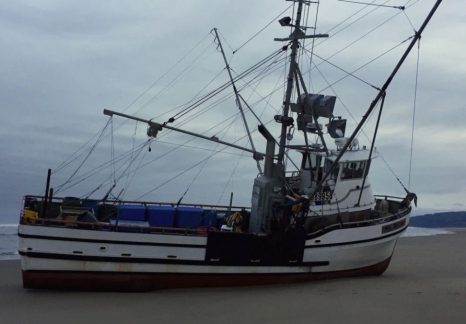 The sight of a large fishing boat grounded on the beach drew spectators to Heceta Beach near the Siuslaw River North Jetty over the weekend. The 50-foot commercial fishing vessel Ms. Nicani ran aground early Saturday morning at Heceta Beach between the North Jetty and Driftwood Shores Resort, while returning to Florence after tuna fishing. The vessel, owned by Florence resident Terry Duman, ran aground just after 2 a.m., Sept. 17. U.S. Coast Guard Sr. Chief Boatswains Mate Tim Tregoning said, “The Coast Guard assisted the crew in setting a stern anchor to make sure the boat would not be pushed farther up onto the beach. Read the story here 08:09
The sight of a large fishing boat grounded on the beach drew spectators to Heceta Beach near the Siuslaw River North Jetty over the weekend. The 50-foot commercial fishing vessel Ms. Nicani ran aground early Saturday morning at Heceta Beach between the North Jetty and Driftwood Shores Resort, while returning to Florence after tuna fishing. The vessel, owned by Florence resident Terry Duman, ran aground just after 2 a.m., Sept. 17. U.S. Coast Guard Sr. Chief Boatswains Mate Tim Tregoning said, “The Coast Guard assisted the crew in setting a stern anchor to make sure the boat would not be pushed farther up onto the beach. Read the story here 08:09




































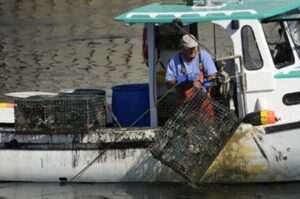
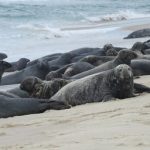
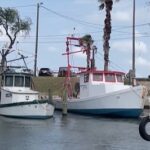









National Marine Fisheries Service Announces Industry-Funded Monitoring Amendment Public Hearings and Comment Period
Share this post